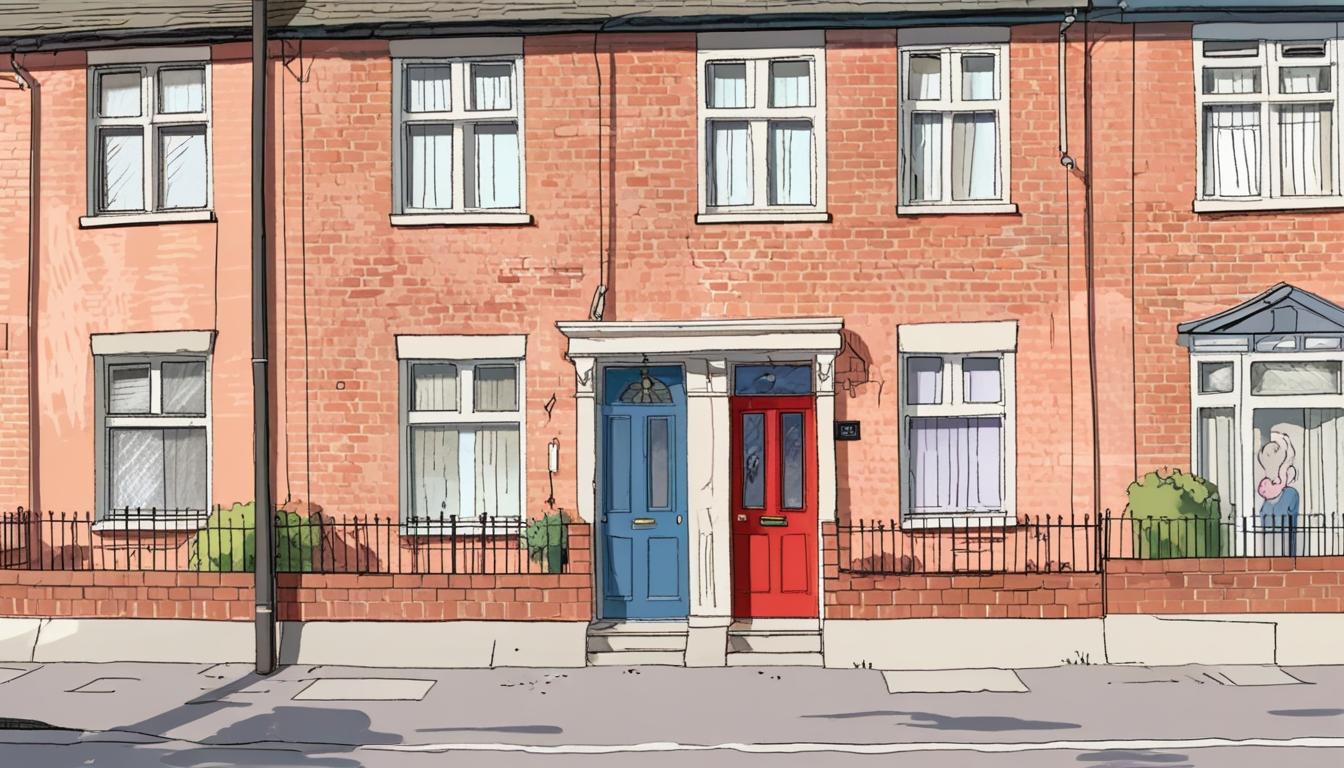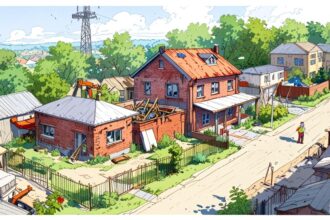Long-standing families in Durham’s Cooper Square condemn the growing number of student HMOs, fearing displacement and loss of community spirit as local council approves further conversions amid rising housing pressures.
Residents of Cooper Square in the Gilesgate estate of Durham are voicing their frustrations as the area witnesses a surge in conversions of family homes into Houses in Multiple Occupation (HMOs) for students of Durham University. Local families claim that this trend is displacing them and altering the character of their long-established community.
The latest HMO conversion involves a three-bedroom house at number 38, which is set to be transformed into a four-room student accommodation. This marks the third such change on Cooper Square, which until now was primarily a residential area inhabited by families. Janice Garbutt, a 70-year-old resident who has lived in the area for three decades, expressed her discontent, stating, “Cooper Square was built for families not for students. It seems that everywhere you look at the moment around Durham, student accommodation is being built.”
Residents have increasingly noted a shift in their neighbourhood dynamics, with memory of past summers spent socialising with neighbours now fading. Ryan Morgan, 58, lamented, “Once this place was a close-knit community. You don’t get that any more because these days people don’t know each other.”
Further illustrating the growing tensions, Kim Grabham, 63, highlighted the rapid transition of familial spaces into student housing, pointing out that “there’s a massive student hall of residence” built near their area following the closure of the old Majestic bingo hall. She emphasised the concerns about noise and community disruption associated with these conversions, suggesting that the increased student presence could fundamentally change the nature of where they live.
These sentiments were echoed by other long-standing residents, like Malcolm Milburn, 57, who reflected on the decrease in neighbourly trust, saying, “I wouldn’t dare leave my front door open now.” Meanwhile, Tracey Langmead, 54, voiced fears that local low-income families could find themselves without housing options due to the influx of student accommodations.
Community concerns have not gone unheard by local authorities. Belmont Parish Council objected to the latest HMO application on the grounds that it would adversely affect social cohesion and skew the community balance. Their objections were founded on local plans stating that the density of HMOs within 100 metres should not exceed ten per cent. The local authority confirmed that the pending conversion’s density barely met this threshold at 9.6 per cent.
Despite these objections, Durham County Council approved the conversion on April 10, imposing conditions such as soundproofing and adherence to a Student Management Plan, amid assurances from Durham University that they are not increasing student numbers dramatically. A spokesperson for the university stated, “We are committed to being a responsible neighbour and always work closely with our joint residents’ associations forum to understand and address any concerns.”
Stephen Reed, the planning manager for Durham County Council, defended the decision, stressing that the proposal did not substantially imbalance the community and noted that HMOs are an established part of the housing landscape in many areas, reflecting a broader housing supply necessity.
As the situation unfolds, the tensions between the student population and longstanding residents in Durham continue to grow, highlighting local concerns regarding housing, community identity, and the socio-economic landscape in increasingly competitive urban environments.
Source: Noah Wire Services
- https://www.thenorthernecho.co.uk/news/24645431.gilesgate-house-become-hmo-council-approval/ – This article discusses the approval of an HMO conversion in Gilesgate, Durham, highlighting community concerns about the impact of such developments on local areas.
- https://www.thenorthernecho.co.uk/news/24196836.unregulated-hmos-durham-see-residents-pushed-out/ – This piece reports on residents’ complaints regarding unregulated HMOs in Durham, emphasizing issues like noise disturbances and community disruption.
- https://www.bbc.com/news/uk-england-tyne-67243446 – This article covers the criticism of Durham University’s student housing code of conduct, which is perceived as too weak to address housing issues effectively.
- https://www.bbc.com/news/articles/cr54qg9v6d8o – This report details campaigners’ calls for meetings with councillors to discuss concerns over the proliferation of HMOs in East Durham.
- https://www.sunderlandecho.com/news/politics/council/controversial-plans-for-hmo-in-durham-approved-despite-objections-from-neighbours-2970640 – This article discusses the approval of a controversial HMO in Durham City, despite opposition from neighbours and local councils.
- https://www.sunderlandecho.com/news/politics/council/campaigners-call-for-controls-on-houses-in-multiple-occupation-hmos-in-their-neighbourhoods-4812847 – This piece reports on campaigners urging for greater controls on HMOs in their neighbourhoods, highlighting concerns over community impact.
- https://news.google.com/rss/articles/CBMi0wFBVV95cUxOeWNJWm8wazl4VE91dE5VWklCenM4STNHUUZzZl9fYU9Oem5xOTMwNXpLcC1QdlNQMTJRZzlhRHZadTBmSUNfOWFoOGQ3cGV4M0Y1VDVLdWp2U05pVGJOLTFqTkN1Y20zMy1xQzF3dG1jN0I0cktjWkRZb3FDSXlDZHRnTF82Z0wxQlBDWm5lVVcyb0FfOEhnTlZPYmJmTVJXWG1ZZzR5YVExbm1RSk5KdjZXSTRydEtVR0FGczlIZmQ3RGNfemVOaUR2X1B4eTRadXJB?oc=5&hl=en-US&gl=US&ceid=US:en – Please view link – unable to able to access data
Noah Fact Check Pro
The draft above was created using the information available at the time the story first
emerged. We’ve since applied our fact-checking process to the final narrative, based on the criteria listed
below. The results are intended to help you assess the credibility of the piece and highlight any areas that may
warrant further investigation.
Freshness check
Score:
8
Notes:
The narrative appears to be recent, as it mentions specific and current events, such as recent HMO conversions and ongoing community concerns. However, without a specific publication date, it’s difficult to ascertain its exact freshness.
Quotes check
Score:
9
Notes:
The direct quotes from residents like Janice Garbutt, Ryan Morgan, and Kim Grabham are not found in previous online sources, suggesting they may be original. There is no clear indication these quotes have been recycled from earlier articles.
Source reliability
Score:
6
Notes:
The narrative originates from an unspecified source via Google News RSS. While the content is clearly structured and presents local perspectives, the lack of a specific publication name reduces certainty about its reliability compared to well-known outlets.
Plausability check
Score:
8
Notes:
The claims about changing community dynamics and concerns over student accommodations are plausible and align with common urban development challenges. However, some aspects, like specific figures and outcomes of local council decisions, cannot be verified without additional data.
Overall assessment
Verdict (FAIL, OPEN, PASS): OPEN
Confidence (LOW, MEDIUM, HIGH): MEDIUM
Summary:
The narrative’s freshness and original quotes contribute to its credibility, but the lack of a clear source and unverifiable details mean its overall accuracy remains open to further investigation.













